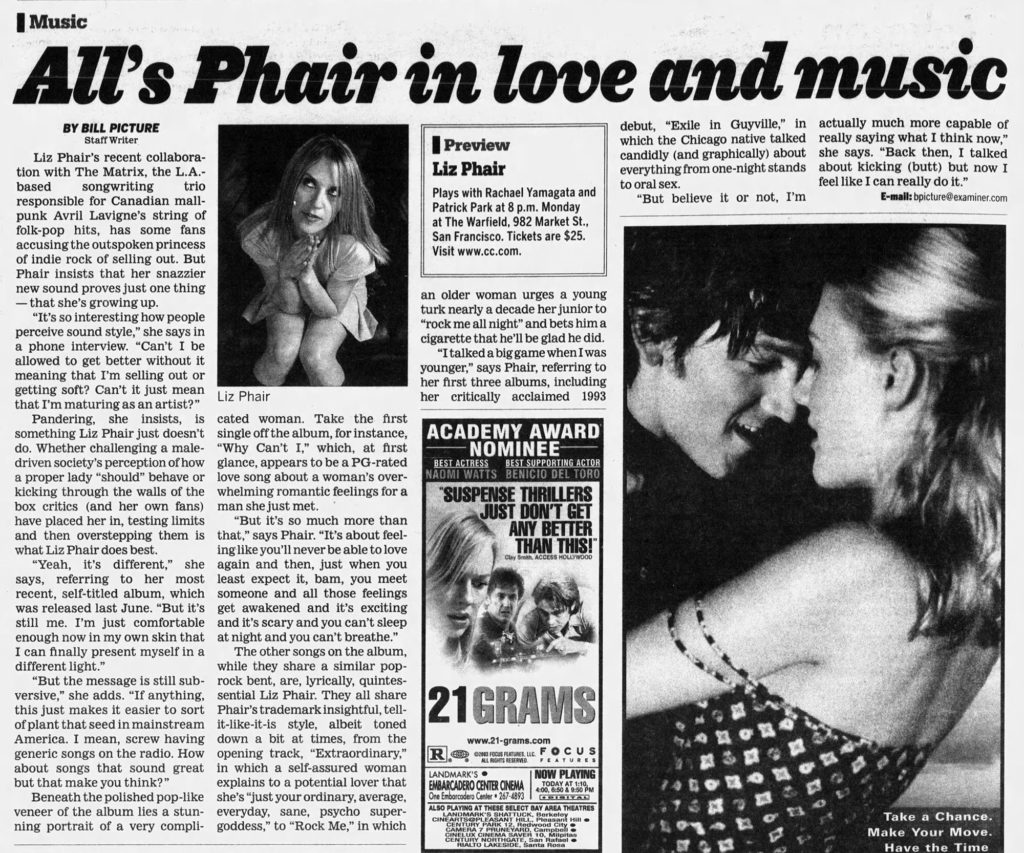By Bill Picture
San Francisco Examiner, February 27, 2004
Liz Phair’s recent collaboration with The Matrix, the L.A.-based songwriting trio responsible for Canadian mall-punk Avril Lavigne’s string of folk-pop hits, has some fans accusing the outspoken princess of indie rock of selling out. But Phair insists that her snazzier new sound proves just one thing — that she’s growing up.
“It’s so interesting how people perceive sound style,” she says in a phone interview. “Can’t I be allowed to get better without it meaning that I’m selling out or getting soft? Can’t it just mean that I’m maturing as an artist?”
Pandering, she insists, is something Liz Phair just doesn’t do. Whether challenging a male-driven society’s perception of how a proper lady “should” behave or kicking through the walls of the box critics (and her own fans) have placed her in, testing limits and then overstepping them is what Liz Phair does best.
“Yeah, it’s different,” she says, referring to her most recent, self-titled album, which was released last June. “But it’s still me. I’m just comfortable enough now in my own skin that I can finally present myself in a different light.”
“But the message is still subversive,” she adds. “If anything, this just makes it easier to sort of plant that seed in mainstream America. I mean, screw having generic songs on the radio. How about songs that sound great but that make you think?”
Beneath the polished pop-like veneer of the album lies a stunning portrait of a very complicated woman. Take the first single off the album, for instance, “Why Can’t I”, which, at first glance, appears to be a PG-rated love song about a woman’s overwhelming romantic feelings for a man she just met.
“But it’s so much more than that,” says Phair. “It’s about feeling like you’ll never be able to love again and then, just when you least expect it, bam, you meet someone and all those feelings get awakened and it’s exciting and it’s scary and you can’t sleep at night and you can’t breathe.”
The other songs on the album, while they share a similar pop-rock bent, are, lyrically, quintessential Liz Phair. They all share Phair’s trademark insightful, tell-it-like-it-is style, albeit toned down a bit at times, from the opening track, “Extraordinary”, in which a self-assured woman explains to a potential lover that she’s “just your ordinary, average, everyday, sane, psycho super-goddess,” to “Rock Me”, in which an older woman urges a young turk nearly a decade her junior to “rock me all night” and bets him a cigarette that he’ll be glad he did.
“I talked a big game when I was younger,” says Phair, referring to her first three albums, including her critically acclaimed 1993 debut, Exile in Guyville, in which the Chicago native talked candidly (and graphically) about everything from one-night stands to oral sex.Mo<“But believe it or not, I’m actually much more capable of really saying what I think now,” she says. “Back then, I talked about kicking (butt) but now I feel like I can really do it.”
Featured Image: Liz Phair (Photo: Jim Cooper/AP)








